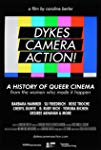Eye For Film >> Movies >> Dykes, Camera, Action! (2018) Film Review
Dykes, Camera, Action!
Reviewed by: Jennie Kermode

A few years ago, at a screening of The Children's Hour, I encountered an elderly lesbian couple who had gone to see it on a date when it first opened in 1961 - at a time when holding hands would just be seen as a sign of friendship but a quick peck on the lips could see women hounded out of the cinema. Back then, as is noted early on in this documentary, one took what one could get. Films with lesbian characters were few and far between. They almost always had tragic endings - and yet it meant a great deal to see any kind of representation of one's own life onscreen.
The biggest problem with these early representations of lesbianism onscreen (or early post-Hays Code representations - that brief earlier period is not discussed, perhaps because there's no-one left who's old enough to recall it) is that they were almost all created by men and shown from a male perspective, with a lot of gentle kisses and wistful looks and little in the way of convincing sexual passion. Miranda July's Meshes Of The Afternoon is referenced here as an early challenge to that hegemony, but the real focus of the film is on the conscious effort made by lesbian filmmakers in the Eighties and beyond to reflect the lives they knew and lived and to drive forward a wider culture of queer film that challenged ideas around gender, race, embodiment and desire.
It seems appropriate that this documentary should emerge in 2018, the year when lesbian-themed film has finally come of age and found its place within the mainstream as well as within art film and radical spaces. Todd Haynes' Carol, released in 2015, is recognised as a turning point, and there is an affectionate look back at 1991's Thelma And Louise which, though never explicit about the nature of the bond between its heroines, fitted a queer narrative in other ways. Desiree Akhavan, whose Appropriate Behaviour made a splash in 2014, reflects on her own coming out and how she felt as if she were the only bisexual Iranian woman in existence, and it points to the importance of representations remaining diverse (as flagged up 18 years earlier in The Watermelon Woman, whose director, Cheryl Dunye, also makes a contribution). The truly radical thing about the New Queer Cinema was that it strove to avoid leaving anyone behind.
Dykes, Camera, Action! is itself imbued with that ethos. It doesn't elide bisexuality and it makes room for positive reference to gay men and trans people's contributions to cinema. Several contributors reference past relationships with a men in a matter-of-fact way that speaks to their confidence in their own identity, but there is also reference to homophobia and what it can do to a person to have to fight every day to defend who they are. Queer cinema matters, it is stressed, because it does so much to influence the perceptions and beliefs of viewers. Lesbians seeing lesbians on film feel validated, accepted into the world. Straight people seeing lesbians on film have the opportunity to relate to them as human beings.
All the usual issues surrounding activism emerge here - most pertinently, perhaps, the tension between being safe if overlooked and being regarded with hostility if speaking up and demanding a place in the world. What really stands out, however, is just how much these particular activists achieved and how swiftly they did it, despite being largely unskilled when they started out. There is also much that will be fascinating to filmmakers of all backgrounds in the detail of the way they went about reinventing aspects of established practice, introducing new perspectives through new approaches to narrative.
Visually simple as this is, with a mixture of talking heads and film clips, it's an impressive potted history of an important movement in cinema with an equally impressive list of contributors. It's a must for film students, and casual film fans who haven't given the subject much thought before are likely to find that it opens their eyes to new ways of looking at the cinema they know and love.
Reviewed on: 05 Oct 2018
















